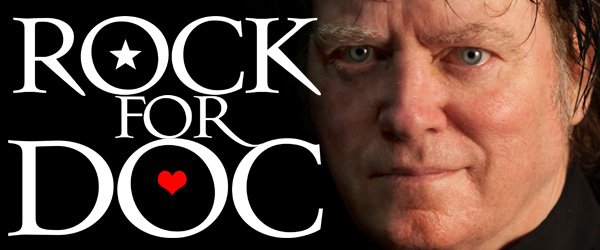
– Source: SkyNews.com.au
He was one of Australia’s great front-men who came to embody a golden era of live music in the nation’s history.
As charismatic as he was elusive, Bernard ‘Doc’ Neeson died in his sleep on Wednesday morning after battling a brain tumour for 17 months.
The lead singer with Australian rock band The Angels was known for his defining stage presence.
Born in Belfast, Northern Ireland in 1947, Neeson emigrated to Adelaide with his family as a teenager in 1960.
He didn’t set out to become a rock star, initially pursuing a teaching career.
During his last year at teachers’ college in Adelaide he was drafted into the army and sent to Papua New Guinea to teach the Pacific Island Regiment.
After military service, he returned to Australia and enrolled at Flinders University to study filmmaking.
There he met brothers John and Rick Brewster and the trio formed the Moonshine Jug and String Band.
The acoustic blues band attracted interest from EMI which offered them a record contract at the beginning of 1974.
However, in a recent interview with AAP guitarist John Brewster said the band turned down the contract so they could form the rock outfit, The Keystone Angels.
But the label wasn’t interested – even after they played what would become one of the band’s biggest hits.
‘We did the demo of Am I Ever Gonna See Your Face Again, they (EMI) passed. They said thanks but no thanks,’ Brewster said.
In 1975 the band was brought to the attention of Albert Studios by AC/DC and it only took a week for a deal to be offered.
Within a year, the band had become the Angels and was staking its place in the Australian music scene.
They released Am I Ever Gonna See Your Face Again in 1976 and their debut single had the ability to rouse a crowd into a frenzied, expletive-filled refrain.
Brewster told AAP Neeson used an oxygen tank off stage in the early days during some particularly crowded gigs in small venues.
‘Doc’s singing all this stuff and he’s belting it out, and those songs are fairly frenetic, so Doc would be literally running out of air so we had this oxygen tank,’ he said.
The Angels had a slew of hits throughout the rest of the 1970s, 80s and early 90s, including Take A Long Line, Shadow Boxer, No Secrets and Stand Up.
Former drummer Brent Eccles, who played in the band for 20 years and managed The Angels for a period, described Neeson as a ‘one off’.
‘I loved working with him. Anyone who ever had a chance to work with him was eager because there was never going to be another one like him. And there’s not.’
Neeson suffered a set back in 1999 when, one week before he was due to perform for Australian troops in Dili, East Timor, he was injured in a car accident.
The singer went ahead with the performance despite being in chronic pain.
Governor-General Peter Cosgrove, the then commander of the INTERFET forces in East Timor, later described the singer as ‘a rascal, but a very good rascal’.
On his return to Australia, Neeson continued to struggle with pain and depression after the accident and stopped performing with the Angels.
Soon ‘divisions in the band’ began to emerge, former drummer Graham ‘Buzz’ Bidstrup told the ABC.
The Brewster brothers continued to tour with different line-ups.
‘Unfortunately … there was a big split in The Angels,’ Neeson said on the ABC program Australian Story, broadcast in April.
Bidstrup described the situation as ‘nasty’.
‘It did get nasty around the time, the way that it started to manifest itself was, you know, if one side couldn’t own the name, they were going to stop the other side from using it.
‘No one’s shy in this band about saying what they like or they hate,’ Bidstrup said on the show.
Neeson began performing again on-and-off from 2003, in his band Doc Neeson’s Angels.
In 2012, Neeson had a seizure and was diagnosed with a high grade brain tumour.
Midnight Oil drummer Rob Hirst remembers a benefit night held for Neeson in April 2013.
‘It was incredible that Doc, who was clearly not feeling well, rallied himself to show up on the night. That shows the kind of fellow Doc was, he was born to perform,’ Hirst said.
Three weeks after the Rock for Doc concert, Neeson was presented with an Order of Australia by NSW Governor Marie Bashir.
Rock historian Glenn A Baker says Neeson was interested in drama and poetry.
‘I remember once having a conversation with him about Japanese Haiku poetry,’ Baker said.
‘You can mark him down as one of the finest Australian rock vocalists and rock stage men that we’ve ever known.’
Neeson is survived by his partner Annie Souter and four children, Dzintra, Daniel, Aidan and Kieran.
In his last tweet the frontman thanked those who had supported him: ‘In hospital again bored as Hell. Thanks everyone for your wonderful support.’

Be the first to comment